
Topics
Guests
- Kadiatou Diallomother of Amadou Diallo, who was shot 41 times by New York police on February 4, 1999.
Early Saturday morning, five New York police officers fired 50 shots at a car carrying Sean Bell, who had just left his bachelor party on the eve of his wedding with two friends. On Monday, Mayor Michael Bloomberg said the shooting of the unarmed men was “unacceptable” and “inexplicable.” [rush transcript included]
Transcript
AMY GOODMAN: New York Mayor Michael Bloomberg met with black politicians and community leaders at City Hall yesterday, two days after the deadly police shooting of an unarmed African-American man in Queens. Early Saturday morning, five officers fired 50 shots at a car carrying 23-year-old Sean Bell, who had just left his bachelor’s party on the eve of his wedding. He was with two friends. None of them were armed. Bell died before reaching the hospital. His friend Joseph Guzman remains in critical condition after being hit by 11 bullets, and Trent Benefield is in stable condition with wounds to his leg.
Following the talks, Mayor Bloomberg held a news conference with Police Commissioner Raymond Kelly and city leaders. Bloomberg expressed confidence in Kelly, but said police officers may have used excessive force.
MAYOR MICHAEL BLOOMBERG: Nobody takes this more seriously than Commissioner Kelly and I do. We are both very proud of our police department and the officers that work there. But I can’t tell you that every time everyone does the right thing. And whether they did the right thing or not this time, it sounds to me like excessive force was used, but that’s up to the district attorney to find out. And I do not want to prejudice their investigation.
AMY GOODMAN: Queens District Attorney Richard Brown said Monday his office is investigating the shootings, and the results will be presented to a grand jury. The five officers have meanwhile been placed on administrative duties. They have yet to be interviewed by police officials. According to Commissioner Kelly, the officers were there staking out the club for prostitution and drug activity. Police sent two undercover cops inside, where they apparently spent the next few hours nursing drinks and mingling with the crowd. Neither officer was given a breathalyzer test afterwards.
The situation began to unravel when one of the undercover cops alerted the back-up team outside that a man inside was possibly armed. The police claim the shooting occurred after Bell’s car hit one of the undercover officers and an unmarked police minivan. Friends and family of Bell say they may have mistaken the plainclothes officers for robbers and tried to get away. The undercover officer fired first, squeezing off 11 rounds; another officer, a 12-year veteran, fired 31 times, meaning he paused to reload.
The shootings provoked outrage and raise new questions about racial profiling and the NYPD. The Reverend Al Sharpton, who attended Monday’s talks, spoke to reporters outside City Hall afterwards.
REV. AL SHARPTON: To my left is Bishop Lester Williams, who is the pastor for the Bell family. We have Bishop Williams, who is with the Guzman family; of course, Reverend Herbert Daughtry, and our fighting councilman, Charles Barron. We were part of a about two-hour program with the mayor and police commissioner. It was a very candid, very blunt meeting. We said what we felt. He responded. I think that the main thing we have said is that this city must show moral outrage that 50 shots were fired on three unarmed men.
There must also be a review of policy that allows drinking while vice squad people are working. And there is no real testing. There is no test, sobriety test, given at the scene. We also express that there has been a pattern of disrespect, disregard and absolute unfairness in our community—a pattern that must stop—and that there must be a dramatic change in how this administration, from the top, deals with it. Councilman Barron has been very public about his call on the police commissioner stepping down. One Hundred Blacks in Law Enforcement found him to have a no vote of confidence.
Well, we said to the mayor we are meeting this afternoon with the DA. We do not, in any way, shape or form, see how these police could have operated in any way that one could find was not beyond the law. At what point do you continue to fire, even reload, and not realize that no one is shooting at you? And to say that one gun causes an atmosphere where you keep shooting is to tell me and everyone that was sitting in that room that if one policeman makes a mistake, you could be subjected innocently to what could amount to a firing squad. That is no way to run a city. And that is no way to give comfort.
We said to the mayor we understand the crime problem. We understand, because many of our communities have the worst crime problems. But imagine, Mr. Mayor, living in a city where you have to live with the fear of the cops and the robbers. Some in the city worry about the robbers. We have to worry about both. And that was the appeal that we made. This mayor has better manners than his predecessor. Let’s see if we have better policy. We prefer talking than not talking, but the object is not a conversation. The object is fairness and justice. So, is it better that he met than Giuliani didn’t? Let’s see what the results are, because we’re not just interested in being treated politely. We’re interested in being treated fairly and rightly. And that will happen when police are held as accountable as anyone else.
Lastly, there are those that are calling for peace and calm. The presence of peace is justice. Many are not calling for peace, they’re calling for quiet. They want us to shut up and suffer in silence. If you want peace, you give justice. You don’t tell people to shut up when they’re hurting. You find out their pain, and you resolve the pain. And people wouldn’t be hollering, if they weren’t in pain. Thank you very much. We’re going to help the family with the funeral arrangements.
AMY GOODMAN: The Reverend Al Sharpton speaking outside City Hall on Monday. Many people compared the shooting of Sean Bell to the death of Amadou Diallo. He was killed on February 4th, 1999, when police fired 41 shots at him as he was entering his apartment. An Albany, New York, jury acquitted the officers of all the criminal charges, but eventually his family was awarded $3 million.
Amadou’s mother, Kadiatou Diallo, joins us now from Washington, D.C. We welcome you to Democracy Now!, Kadiatou Diallo.
KADIATOU DIALLO: Thank you, Amy.
AMY GOODMAN: It’s good to have you with us. You just happened to be in New York City this weekend for the premier of a movie about Amadou called The Death of Two Sons, when this took place in Jamaica, Queens. Is that right?
KADIATOU DIALLO: It took place in East Village on—at 2nd and 2nd Avenue in New York City at the African Diaspora Film Festival. We were screening the film there, and the audience, after the film was finished, we opened for question and answers. There was a gentleman who came right from the rally of Reverend Al Sharpton, and he informed me that this incident has took place in Queens.
AMY GOODMAN: And your response?
KADIATOU DIALLO: I was shocked. I could not believe it, having to live the tragedy and trauma of losing my son in police bullets, 41 bullets, February 4th, 1999. We were sure that it’s going to be tough, but I dedicated my life to join the community and ask for positive changes.
Ever since then, I have, through the Amadou Diallo Foundation Inc., traveled across the country to speak about sensitivity and speak about police brutality. I have contributed so much with other mothers, who—whose children has been also victimized by the police. To name a few, Mrs. Baez, whose son Anthony Baez was also killed in the Bronx, and Mrs. Busch, the mother of Gidone Busch, whose son was also killed. And we wanted to talk to, in a different way, tell the story so that we can bring the community at large with all ethnicity to face this crisis and speak on common cause to help us, is the problem. Is not the case apparently, because look at what happened now.
AMY GOODMAN: Kadiatou Diallo, if you could remind our audience what happened, and the similarities—I mean, of course, there are many differences. Your son, 22 years old, in New York City, died in a hail of 41 police bullets. In this case—and that was four police officers. This is five.
KADIATOU DIALLO: Yes.
AMY GOODMAN: And Sean Bell died in a hail of 51—50 bullets.
KADIATOU DIALLO: Yes. Amadou Diallo was working that day. He came a little before midnight in the Bronx at 1157 Wheeler Avenue. And he got in the apartment and spoke with his roommate. And he said he was tired, but he wanted to go out to find something to eat. Then he got out. Four police officers belonging to the Street Crime Unit on—were driving unmarked car, and all were in civilian clothes, armed with nine-millimeter weapons, and loaded with 16 bullets each. They saw my son in the vestibule, at the entrance of the vestibule where he lived. And they came right at him and draw—with their guns drawn, and started shooting at him. That’s what happened, and which led to the death of my son, an innocent young man, who have a future, was working hard as a vendor in Manhattan to save money to pay his way to college.
I heard that Bell also was out that night and celebrating a wonderful, wonderful time with his friends, which was a bachelor party, because he was going to get married, according to the report, what I read. The similarity of the case, I think, to me, is that one thing is first and foremost, is that Bell was a young man, black man, in the night, middle of the night. The officers were in civil—they’re undercover officers and driving unmarked car, too. So, I don’t know about the other details of this shooting, but I do know the fact that Bell was a young black man, 23 years old, the stereotyping exists. What I’m speaking about throughout the country is that young black male has been profiled before my son was killed and after. It’s still happening. We have to call for change.
AMY GOODMAN: Mrs. Diallo, last night on a lot of the news programs, the police were represented in force. And one of the theories that was put forward, that I heard repeated over and over again on the networks, is this theory of contagious shooting, that it’s something that’s uncontrollable, that when one officer fires, it’s something that just becomes automatic, and other officers fire. And it’s a phenomenon, the police officers were saying, and the commissioner, that they are looking at now called contagious shooting. Your response?
KADIATOU DIALLO: It’s interesting. I don’t think if this incident was in Manhattan—I truly believe that if this incident happened in Manhattan with a white male driving at night like Sean was driving with his friends, I don’t think they would have contagious actions. It’s coming back to the fact that, Amy, they portray the black male as dangerous and wild. Each time the encounter happen, that is the case. We have to face the fact that young black male are stereotyped as violent criminal in most cases, whenever shooting cases happen between black male and police officers. If in their mentality they are facing the threat, what they call threat is the black male that they are apprehending, this led to the tragedy that is happening all the time.
So, I call—I really salute the mayor for the response that he did, which was different than the former administration when my son was killed. He is talking with the community leaders. And the police commissioner, Raymond Kelly, I remember—it’s in record—when he took office, he said, “This time, cases like Amadou Diallo will never happen under my watch.” So, why this happen again? This is my question.
AMY GOODMAN: There were five police officers in this case, apparently two African-American, two Latino, one white officer. The white officer was the one who fired 31 times, a many-year veteran of the police force. We don’t know a lot about them or what they’re saying. And it goes back to something you also dealt with, and I was wondering if you would explain this, something in New York that’s known as the 48-hour rule.
KADIATOU DIALLO: Mm-hmm.
AMY GOODMAN: What is that?
KADIATOU DIALLO: The 48-hour rule, I learned, after talking with many elected officials, was a time given to officers when they—whenever they are involved in a shooting case, that they cannot talk. They will not be interviewed. They will not be tested for drug or alcohol. We proposed a package, under the leadership with Ruben Diaz, from the representative of the Bronx. A package bill was called the Diallo and Baez Bill. We went to Albany to lobby for the bill to be passed, so that every—any time a police officers use their gun to innocent person, they would be subject right away, being tested for drug and alcohol. The bill died in the House.
AMY GOODMAN: We also know, according to Police Commissioner Raymond Kelly, that two of the officers were inside the club and were drinking, I think they said, had two drinks.
KADIATOU DIALLO: Yes. I mean, if they—if they—you remember Dorismond case. As soon as he was killed, his record was opened up. Even the sealed record, they opened it up and talk about his past. If the officers who are responsible for the crime does not be subject, did not—they have not put them into the same—into the same level, like which mean they have to answer questions and be submitted to testing. It’s unfair. It’s unbalanced, I think, in my view.
AMY GOODMAN: Apparently, they say they just have to be approved by a—they don’t have to be tested, but just have to be approved by a supervising officer.
KADIATOU DIALLO: That’s interesting.
AMY GOODMAN: Well, this case is going to go to a grand jury, according to the Queens district attorney. What do you see unfolding? We have seen over the last few days major protests taking place. In the case of your son, you had Congressman Charles Rangel arrested. You had the former mayor, David Dinkins, arrested at Police Plaza, demanding that there be justice. What do you see happening here? And do you have any words of advice?
KADIATOU DIALLO: First and foremost, my heart goes out to the Bell family. And I pray for the two young males who are in the hospital to be recovered their health and be able to testify as to what happened. I have seen Reverend Sharpton standing up like the way he stood up for us when my son was killed, and other elected officials went with him to meet with the mayor. I expect for them to continue to put pressure, so that the community will receive justice.
To the family, I hope that they can have proper representation, because it’s a long road. It’s a difficult one. You remember when the indictment was given to the four officers who were responsible for killing my son. After the indictment, we were hoping that the trial will happen in the Bronx, where the crime happened. And the judge, one judge, you know, gave the officers—granted them a change of venue. I hope that this will not happen this time, because had the trial happened in the Bronx, I think the outcome of the criminal case, when my son was—when the officers who killed my son were tried, would be different, because they were acquitted of all charges, because, you remember, Amy, the trial was moved to Albany, where I was told—excuse me—there was no conviction against police officers in Albany.
AMY GOODMAN: We’re—Kadiatou Diallo, we have to wrap it there. And I want to thank you very much for being with us. I am sure we will come back to you over the case that is happening today. And we will continue to cover it.
KADIATOU DIALLO: Thank you. Thank you, Amy.
AMY GOODMAN: Thank you very much, Kadiatou Diallo, mother of Amadou Diallo, shot 41 times by New York police on February 4th, 1999.

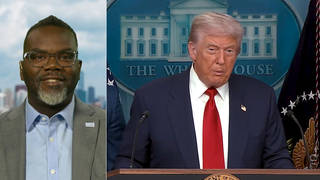

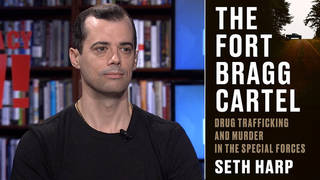
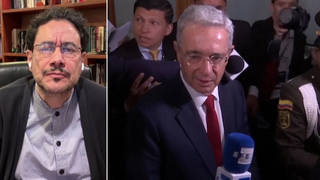





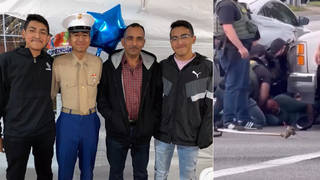
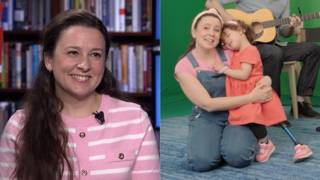
Media Options